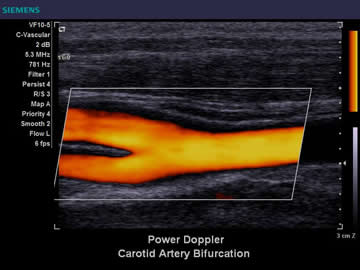
Carotid ultrasound provides a fast, noninvasive way of identifying blockages of blood flow in the neck arteries to the brain .
How to Prepared for a carotid ultrasound.
You may be asked not to smoke or drink caffeine for at least two hours before the test. Smoking and caffeine use can shrink your blood vessels and affect the accuracy of the test. Wear comfortable clothing with an open neck.
The carotid ultrasound is frequently performed to detect narrowing, or stenosis, of the carotid artery, a condition that substantially increases the risk of stroke. Other risk factors can be diabetes, elevated blood pressure, elevated cholesterol, and a family history of stroke or heart disease.
A carotid ultrasound is also performed to:
- check the state of the carotid artery after surgery to restore normal blood flow.
- verify the position of a metal stent placed to maintain carotid blood flow.
Doppler ultrasound images can help the physician to see and evaluate:
- blockages to blood flow
- narrowing of vessels


Indications for a Carotid Ultrasound
- Aphasia
- Amaurosis Fugax
- Syncope
- Lack of Coordination
- Pre Op
- Slurred Speech
- Dizziness and Giddiness
- Carotid Bruit
What Ultrasound Can Determine
- Carotid Artery Disease
- Intimal Thickness
- Trans Ischemic Attack (TIA)
- Cerebral Vascular Attack (CVA)
- Stroke
- Reduced Blood Flow to the Brain
- Subclavian Stenosis
- Subclavian Steel Syndrome

